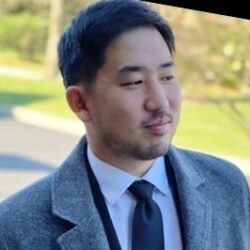In this post, we sat down with Intermediate Coding Bootcamp graduate Daniel Kim to learn about his transition from Special Operations Specialist to the civilian sector, where he’s working as a software engineer at a big corporation. Plus, he shares his advice for other Veterans looking into career skills programs.
What was your background before you came to Hack Reactor? And what inspired you to learn software engineering?
I was in the Marine Corps for nine years, and four out of nine years I was in Special Operations. When you’re in special operations, you’re the main recipient of the best equipment and software the country has to offer. One of the great resources was being able to work with some of the best software engineers. There wasn’t anything I couldn’t ask for that wasn’t done for us to accomplish our mission. I realized I no longer wanted to use other people’s creations and wanted to pursue an education that will allow me to bring my ideas to life.
How did it go for you using VET TEC?
VET TEC is the bridge that made me go from Special Operations to Hack Reactor. For anyone who is transitioning out of the military, the transition period is generally very difficult and the opportunity the Veterans Affairs provides with VET TEC is just amazing.
It’s a fairly new program and it aligned perfectly with my needs as I transitioned out. It brought me to Hack Reactor, and between the curriculum, the other students, and the instructors, it proved to me Hack Reactor’s program is the high standard VET TEC is looking for.
How was your transition from the Marine Corps to a coding bootcamp student?
It was definitely difficult. I’ve always been an advocate for civilian transition courses because going from the military to the civilian sector has its difficulties. Between personalities, expectations, and learning styles, it was hard coming directly from the military mentality and then jumping into Hack Reactor. There were a lot of times when I felt out of place or had to question myself as far as what was appropriate and what was not.
The quality students Hack Reactor brings to the course speaks volumes about their vetting process- even though we all came from different backgrounds, I felt like I was working with professionals. It was just such a safe space to learn from one another and grow.
What was the team dynamic like with your cohort? Did you work closely with other students?
I definitely worked really closely with everyone, which was required for things like pair programming, team sprints, and team development. Even when teamwork wasn’t necessarily required, there was so much cohesion working with my cohort mates. We would form bonds, study together, and help one another with our own strengths and weaknesses.
I’d ask, “who is strong in this subject and willing to help me out?” and someone would always be willing to help. We were so open with one another and allowed ourselves to be vulnerable- we didn’t let our pride get in the way and we were just constantly supporting each other as a team. It was a great cohesion.
What are your favorite parts about working as a software engineer? Is your job what you expected?
The perspective I got from some of my cohort mates about post-graduation expectations gave me insight into the different sectors where software engineering or software development apply. I just wanted to bring my creations to life, and I’m definitely doing that, but it was interesting to learn about all the different ways I could make it happen. I had one peer who wanted to do blockchain and another who wanted to work on quantum computers. They made me realize there’s more to software engineering than just ideation and creation.
As far as the technical side, the job is exactly what I was expecting. Even with the non-technical stuff, Hack Reactor did a good job of preparing us. The format of how we did our day-to-day was meant to be as if we were in agile teams doing sprint planning. In a classroom setting, I didn’t really understand that, but I’m now working at a big corporation and it’s the same format. We do our stand-up, we do our sprint-planning, and we do our retrospectives. It’s exactly the same thing I’ve done every day at Hack Reactor.
Do you have any advice for other Veterans looking at career skills programs? Do you have advice for those who want to become software engineers?
Veterans Affairs definitely has a program that will lead you to success, and VET TEC is one of many. I was trying to handle everything before the application process, and it’s a lot of administrative processes. I thought, “I need to get all this together by myself,” but the reality is every school where you want to use VET TEC has a representative. You should reach out to that representative, build that relationship, and work hand-in-hand with them to ensure everything is in order.
Speaking specifically on Hack Reactor, it was tough, even comparing it to the military. We were working 11-hour days for six days a week, so we were averaging over sixty hours on a weekly basis. And that’s just what was required. Most students came in early, stayed late, and came in on Sundays. We were definitely putting in the work, so be prepared.
I know a lot of Veterans may think it’s different, easier, or they have a mentality about how the civilian world works. No. Hack Reactor definitely puts your dedication and your will to the test, and as Veterans, we should shine in that aspect. For any transitioning Veterans, please join communities, establish good working relationships with those around you, ask for help, be vulnerable, and grow.
_____
Learn about our coding training for military service members and Veterans.

